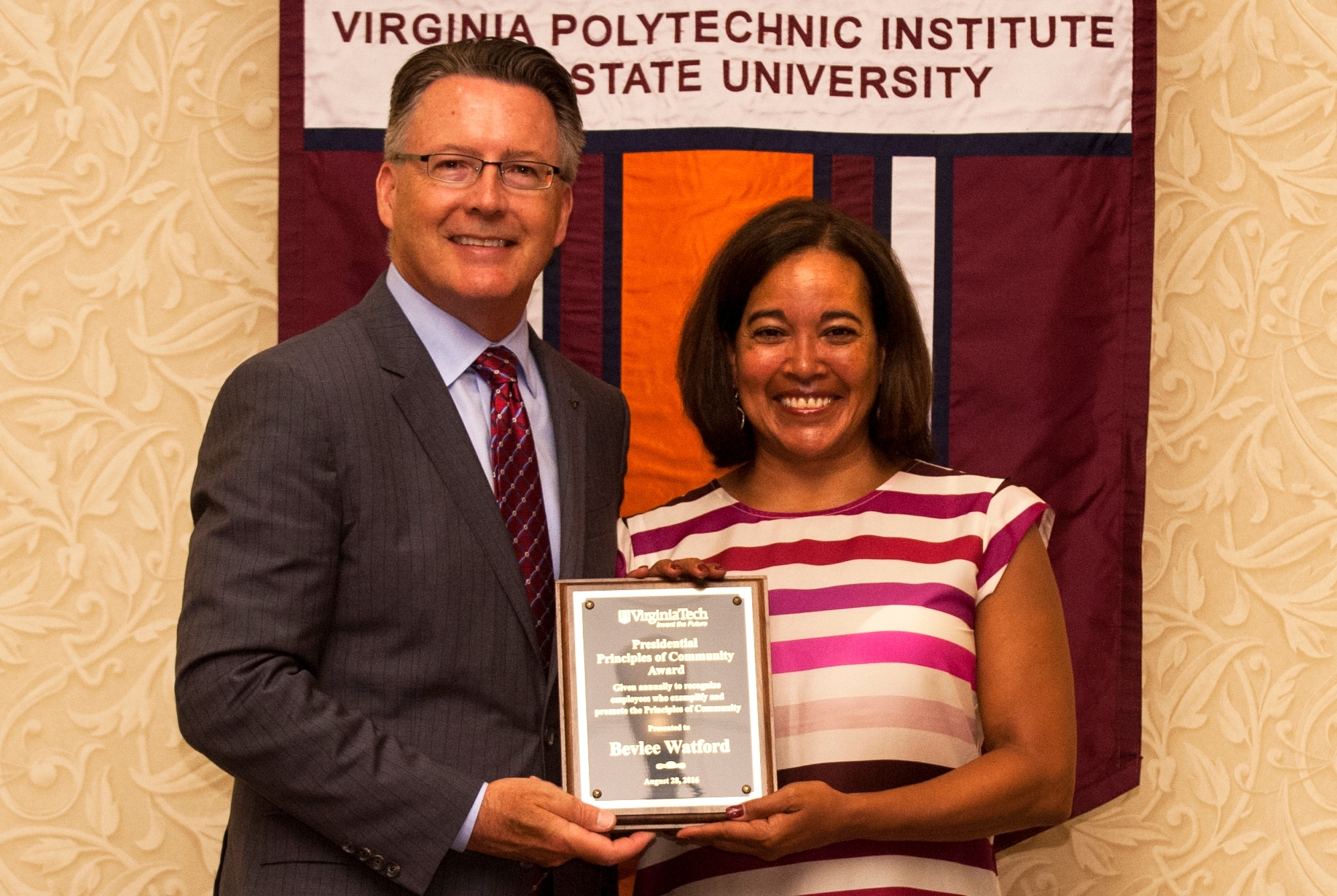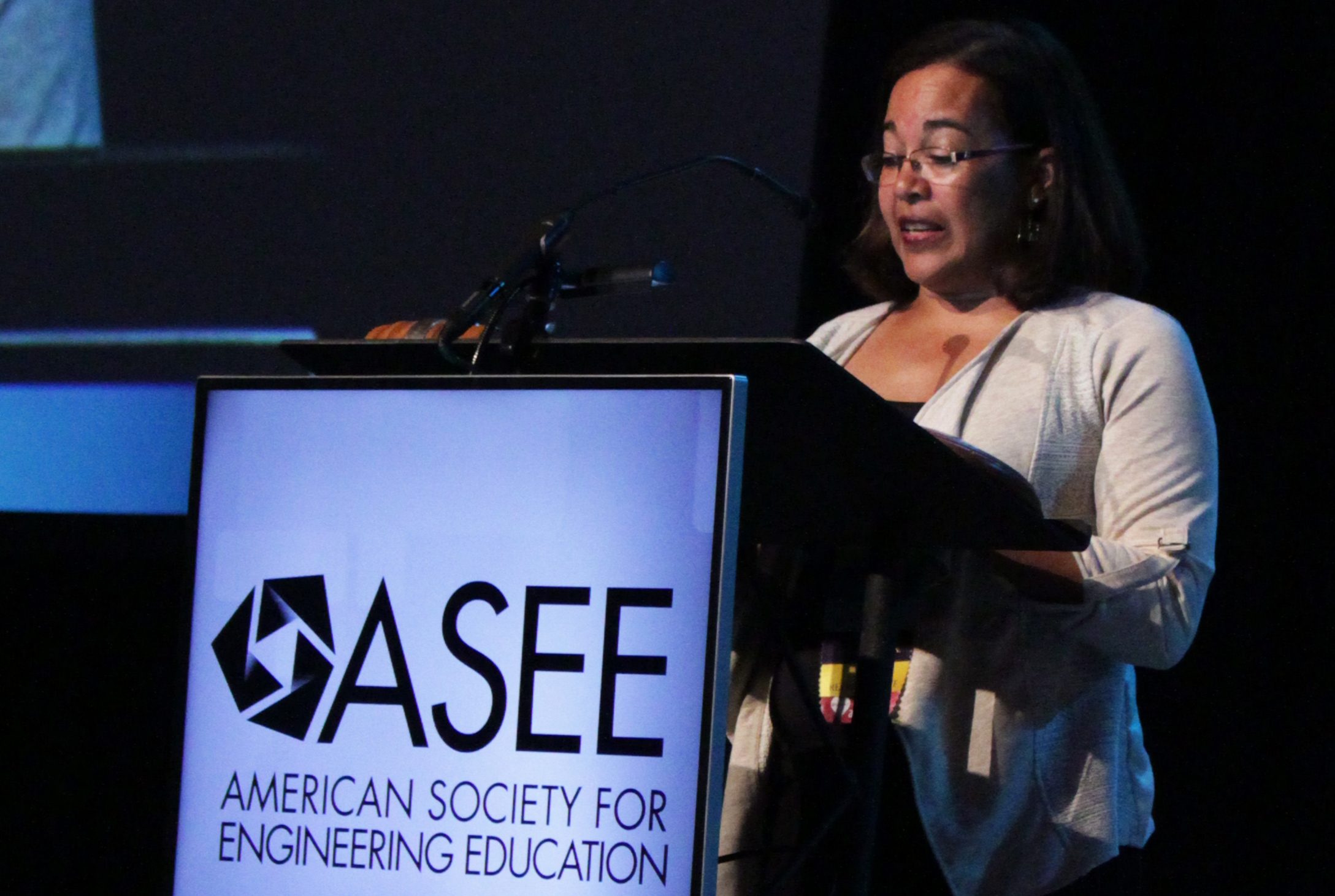Engineering education pioneer named associate dean of equity and engagement
Bev Watford

Her office walls, lined with mahogany framed awards with gold-leaf lettering, photos of smiling faces, and memorabilia reflecting orange and maroon glory, represent longevity of academic excellence, milestones, friendships, and loyalty to Virginia Tech.
A proud Hokie and a nationally renowned pioneer for advancing efforts in diversity and inclusion in engineering education, Bev Watford is excited about her impending new role as the Virginia Tech College of Engineering’s first associate dean of equity and engagement and the future of the enterprise she seeks to further impact.
“I’m really looking forward to pulling up my sleeves and digging in,” said Watford, currently the associate dean of academic affairs for the College of Engineering and director of the college’s Center for Engineering Enhancement of Diversity (CEED). “To be able to focus on empowering communities and groups of people from all backgrounds that we’ve not been able to focus on before is really quite a remarkable thing to think about.”
In her new role, Watford will serve as the college’s chief diversity, equity, and inclusion officer, focused on helping the college achieve and advance inclusive excellence at all levels. She will be responsible for developing policies and implementing programs to increase the recruitment and retention of underrepresented and underserved populations within the college at all levels, to include pre-college, undergraduate, graduate, staff, and faculty.
In 2016, President Tim Sands honored Bev Watford for her contributions to Virginia Tech’s diversity programs with the Presidential Principles of Community Award.

Watford has served in the role of associate dean for academic affairs in the College of Engineering since 1997, responsible for all undergraduate activities, from recruiting to commencement. A national search for a new associate dean of academic affairs has commenced.
As an African American female engineering student at Virginia Tech in the 1970s and the only one that looked like her in most if not all of her classes, Watford faced many obstacles and barriers along the pathway to achieving her bachelor's degree in mining engineering and master's and doctoral degrees in industrial engineering and operations research.
“The barriers I came across as a student and continue to come across as a professional motivates me to assist others,” she explained. “If I can improve the experience of, not only students, but faculty and staff that came through our doors, I know I am moving the college in the right direction.”
With more than 25 years of experience leading CEED, Watford is no stranger to the challenges that face engineering in the changing landscape. Under her leadership, the college has successfully increased its enrollment, retention, and graduation rates with efforts that include pre-college and K-12 STEM programs, living-`learning communities, and peer mentoring.
“Because the college is the fifth largest provider of engineering graduates in the nation, our work in diversity and inclusion can have a large impact on the engineering field,” said Julia M. Ross, the Paul and Dorothea Torgersen Dean of Engineering. “It is imperative that we do better given the need to diversify the engineering workforce and academic pipeline. We are fortunate to have someone with the experience and talent of Dr. Watford leading our efforts. ”
By the year 2022, Virginia Tech's goal is for 25 percent of the student body to be underrepresented minority students, with another 15 percent underserved students — that is, low-income and first-generation students.
In her newly formed role, Watford will seek “new avenues and create innovative programs, so that everyone is at the table,” she said.
More specifically, Watford’s efforts will seek to reach underserved and underrepresented populations that include African American, Hispanic/Latino, American Indian, Pacific Islander, women of all ethnicities, persons with different abilities, veterans, first-generation, low socio-economic status, and members of the LBTQIA+ community.
Recently, the college was among the first in the country to earn a bronze award with exemplar status from the American Society for Engineering Education’s Diversity Recognition Program. The College of Engineering was one of 29 institutions that received exemplar status. The bronze level must first be earned before an institution can be considered for silver or gold recognition.
In 2017, on behalf of Virginia Tech, Watford and Ross accepted the University Rising Star Award from the National Action Council for Minorities in Engineering. The honor was bestowed upon Virginia Tech for its commitment to increasing the number of minorities in engineering.
That same year, the American Society of Engineering Education (ASEE) named Watford their president. She was the first African American female president in the society’s 124-year history.

Virginia Tech President Tim Sands also recognized Watford’s contributions to Virginia Tech’s diversity programs in 2016 when she was honored with the Presidential Principles of Community Award. Established in 2013 by the Office of Diversity and Inclusion, now the Office of the Vice Provost for Inclusion and Diversity, the award recognizes faculty and staff members who exemplify and promote a welcoming and inclusive environment in accord with the university’s Principles of Community.
Her research activities have focused on the recruitment and retention of students in engineering, with a particular emphasis on underrepresented students. Watford has secured more than $11.5 million in funding and support for the program and other undergraduate initiatives from a variety of sources.
Watford is currently leading university’s efforts to promote engineering transfer student success through a $5 million National Science Foundation grant. Watford also serves as an associate editor of the journal Advances in Engineering Education.
An active member of ASEE since 1986, Watford was elected Fellow in 2010 and has served the organization in multiple capacities. She has held elected office in both the women in engineering and the minorities in engineering divisions; chaired the diversity task force that resulted in the creation of the ASEE diversity strategic plan and a standing diversity committee; and served as first vice president and vice president for external affairs working to increase membership.
From 2010-11, Watford served as interim department head of engineering education in the College of Engineering. From 2005-07, Watford served as a program manager in the division of undergraduate education for the National Science Foundation, and from 2013-15 she served as the program director for broadening participation in the division of engineering education and centers.






